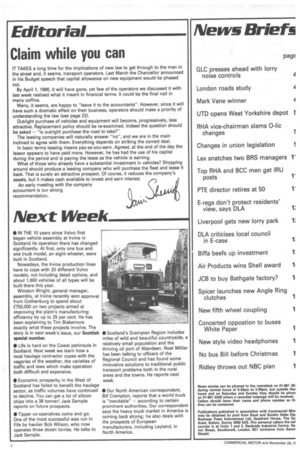Claim while you can
Page 4

If you've noticed an error in this article please click here to report it so we can fix it.
IT TAKES a long time for the implications of new law to get through to the man in the street and, it seems, transport operators. Last March the Chancellor announced in his Budget speech that capital allowance on new equipment would be phased out.
By April 1, 1986, it will have gone, yet few of the operators we discussed it with last week realised what it meant in financial terms. It could be the final nail in many coffins.
Many, it seems, are happy to "leave it to the accountants". However, since it will have such a dramatic effect on their business, operators should make a priority of understanding the law (see page 22).
Outright purchase of vehicles and equipment will become, progressively, less attractive. Replacement policy should be re-examined. Indeed the question should be asked — "is outright purchase the road to take?"
The leasing companies will naturally answer "no", and we are in the main inclined to agree with them. Everything depends on striking the correct deal.
In basic terms leasing means pay-as-you-earn. Agreed, at the end of the day the leasor appears to have paid more. However, he has had the use of his capital during the period and is paying the lease as the vehicle is earning.
What of those who already have a substantial investment in vehicles? Shopping around should produce a leasing company who will purchase the fleet and lease it back. That is surety an attractive prospect. Of course, it reduces the company's assets, but it makes cash available to invest and earn interest.
An early meeting with the company accountant is our strong recommendation.
































































































